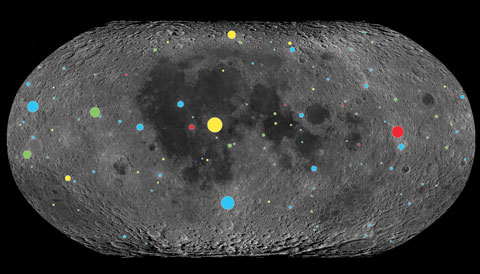
New Study Confirms Methane on Mars – But It’s Not Definitive
Independent methane detections in the Martian atmosphere by the Curiosity rover and Mars Express orbiter add confusion to a convoluted story.

Hayabusa 2 Finds Asteroid Ryugu Is Dark & Dry
Hayabusa 2’s asteroid Ryugu has some unexpected characteristics. In particular, its dry surface could spell trouble for current theories about how Earth obtained its water.

Bumpy Road Ahead For NASA’s Osiris-REX
Asteroid Bennu is turning out to be a hazardous place for the NASA spacecraft to sample: It has uneven, rugged terrain and occasionally even hurls rocks into space.

Asteroid Impacts Increased 290 Million Years Ago, Lunar Craters Reveal
Researchers have estimated the ages of craters on the lunar surface, finding that the rate of large impacts nearly tripled 290 million years ago — an increase that might be ongoing.

Four Things We Now Know About Saturn
Cassini gave an epic final show, going where no space probe had gone before. Here are a few interesting things we learned from that finale.

'Oumuamua’s Story Keeps Spinning
Two new studies question the cometary nature of 'Oumuamua, our first interstellar visitor, and where in the Galaxy it might have come from.

'Oumuamua Was a Comet After All
Researchers have found that 'Oumuamua — the first confirmed object to enter the solar system from interstellar space — was a comet, releasing just enough gas to subtly change its course.

No Planet Nine? Small-body Pile-up Could Explain Odd Orbits
New research shows that interactions between small objects beyond Neptune’s orbit —and not a hypothetical Planet Nine — could be the reason some far-flung solar system objects “detach” from their original orbits.

Did This Wrong-way Asteroid Come from Beyond the Solar System?
An intriguing asteroid was spotted traveling backwards around Jupiter back in 2015. Now a team of researchers think it could have formed around another star.

Amateurs Take Huge Panoramic View of the Milky Way — Without a Telescope
This is what the largest available image of the Milky Way using only off-the-shelf photographic equipment looks like.

Could a Giant Impact Have Vaporized Earth to Create the Moon?
In a new twist on the giant impact theory, a new idea posits that the Moon might have formed from the vaporized remains of Earth after an epic collision with another planet-sized body.

Amateur Astronomer Captures Supernova’s First Light
In 2016 an amateur astronomer was testing his camera — and captured the first flash of a supernova.

Juno Probes Depths of the Great Red Spot
NASA’s Juno spacecraft peeked under the clouds of the most iconic weather feature in the solar system, Jupiter’s Great Red Spot, revealing a complex structure deep below the surface.

New Telescope Sees Galaxy Down to Its Atoms
Astronomers have obtained the most detailed radio image of hydrogen gas in a neighboring galaxy, revealing its structures with more precision than ever before.

Aboriginal Australians Observed Red Giant Stars’ Variability
New interpretations of oral accounts by Aboriginal Australians show that they included references to the variability of red giants Antares, Betelgeuse, and Aldebaran.

Ancient Moon Had Atmosphere Made of Volcano Smoke
Roughly 3.5 billion years ago huge volcanoes released enough gas to cover the Moon with a thin atmosphere that was visible from Earth.

2017 Nobel Goes to Gravitational Waves
Three American physicists have received the Nobel Prize in physics for their contributions to the discovery of gravitational waves.

Millions of Americans Viewed August Solar Eclipse
The 2017 solar eclipse could easily be the most watched event in US history. Can we learn something from it?

Iconic Radio Telescope Begins 7-year Search for New Objects
A new survey promises the most complete map of radio-emitting celestial sources ever made. It will reveal thousands of new objects after seven years of observation.

Puffed-Up Hot Jupiter Is Surprisingly Dark
Researchers have found that a football-shaped, ultra-hot gas giant that’s being devoured by its host star is also one of the least reflective exoplanets ever found.
